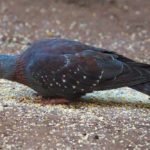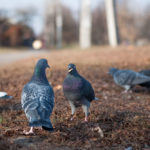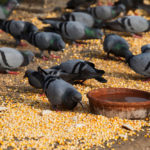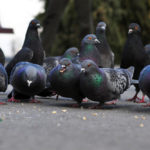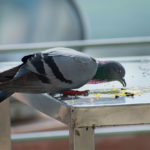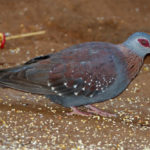Want to Feed Some Pigeons? Here’s Everything You Need to Know
If you’ve ever observed pigeons in the street, you’ll have noticed that they don’t appear to be particularly fussy eaters, and true enough, they aren’t. From insects, to fries, to pastry, to pizza, to hamburgers… there is very little that isn’t on the menu for these city birds, but just because they do eat things, doesn’t mean they should.
The adventurous diet of city-slicker pigeons is one of the reasons they don’t live as long as their captive cousins, and it’s no surprise really. If we humans ate out in the city every day, our health would decline rapidly, too.
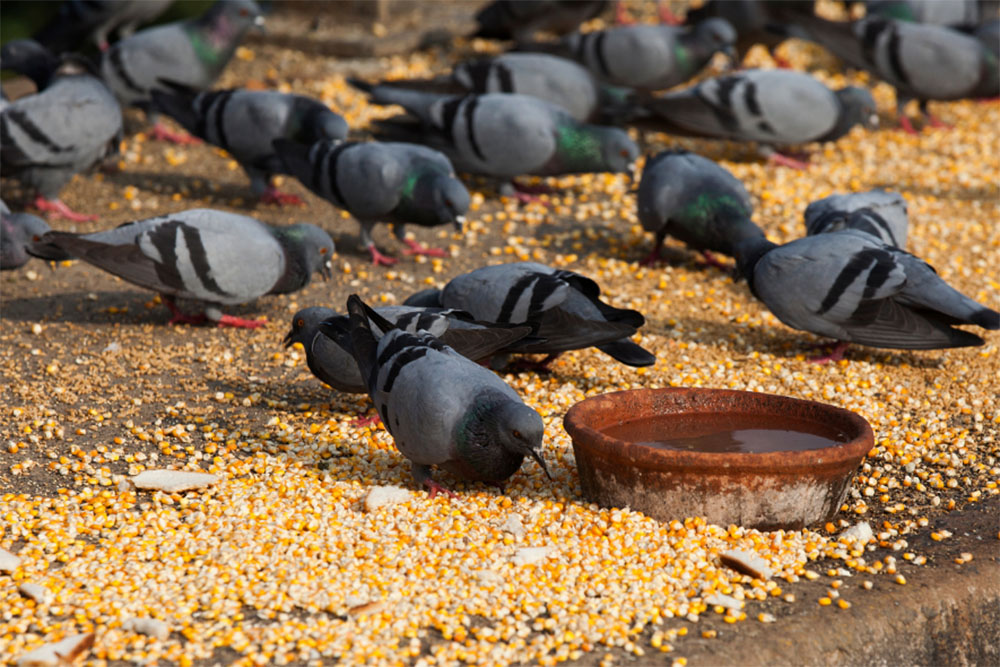
Being that they don’t exactly get to decide what’s for dinner, their bad diet isn’t their fault. It’s a pigeon-eat-pigeon world out there (sometimes literally), and you have to take what you’re given, as no matter how unhealthy it is, it’s better than starvation.
However, if you’re curious as to what these beautiful yet invariably greedy birds are supposed to be eating, you’re in the right place. We’re going to be putting the humble pigeon on a pedestal and discussing their diets in detail.
What Makes A Healthy Diet For Wild And Captive Pigeons?
Much like we earth-bound folk, pigeons require lots of proteins, fats, carbohydrates, vitamins, and minerals in order to grow big and strong.
As granivorous creatures, 50% of these essential nutrients should be derived from grain crops, and 10% from oil seed, which might sound rather dull, but did you know that pigeon tongues only have 40 taste buds? To put that in a bit of context for you, the average human has 10,000 taste buds and catfish have around 100,000 of the things!
Their inability to taste is likely part of the reason that pigeons aren’t too fussed about what they have a peck at. If it vaguely looks like food and feels like food, they’ll gobble it up.
Some of the grains and seeds that pigeons find most appetizing include…
- Sunflower seeds
- Wheat
- Barley
- Millet
- Cracked Corn
- Peas
Pigeons will eat these foods whenever they can find them, but some of them are more valuable at certain times of year. For example, oil seeds such as sunflower seeds can help keep their energy and warmth up during the bitter months of winter, and when the molting season comes around, they’ll need lots more protein-filled snacks.
The diet of a pigeon will also change significantly when they have some squabs (pigeon young) on the way, but more on that in just a bit.
The rest of a feral pigeon’s diet in the country is usually made up of a mixture of fruits, berries, vegetables, and insects, which sounds pretty good if you ask us, well…apart from the insects anyway.
Most fruits are on the table for pigeons, but they have to be careful around apples, not because of the flesh of these juicy fruits, but the seeds.
Many people don’t realize it, but apple seeds contain trace amounts of cyanide, which sounds scary, we know, but there’s no need to banish apples from your fruit bowl, as it would take a heck of a lot of seeds to have an effect on a human.
The digestive systems of pigeons, on the other hand, are not quite as robust, and a seed or two may cause some gastric discomfort.
In regard to what you should be feeding a pet pigeon, you can’t go wrong with a healthy mix of grains and seeds, occasionally paired with a little treat to keep dinner time exciting. Pigeons are very intelligent animals, so although they can’t taste very much, they can get bored with the same thing day in and day out.
This Hagen Pigeon & Dove Seed is a particularly good foundation to build on with your own super healthy additions, but not too many, as mature pigeons only need around 30 grams of food a day to keep them happy and healthy.
Feeding racing pigeons is more or less the same as feeding their non-competitive counterparts, but some owners prefer to tailor meals to specific pigeons to make sure they’re getting all the nutrients they need to develop a sporting edge.
You should follow the same rules when feeding feral pigeons too. They may eat a slice of pizza if given the opportunity, but if you’ve got some grain spare, they’d much prefer that.
Now let’s take a look at some of the best pigeon foods out there!
What Are The Best Pigeon Foods?
Cereal Grains
As we’ve already touched upon, cereal grains are the core of a healthy pigeon’s diet. Their nutritional breakdown is typically something along the lines of 70% carbohydrates, 10% protein, and 5–7% minerals.
They’re also packed full of vitamin B (great for cellular health and a strong metabolism) and E (great for their reproductive health and immune systems).
Unfortunately, cereal grains are lacking in the Vitamin A department, but that’s where corn comes into play.
Corn
Pigeons absolutely love corn, and it makes for a very healthy snack indeed. We’d recommend feeding your pigeons something like Wagner’s Cracked Corn fairly often, as it’s full of protein, aids with digestion, and keeps their energy levels up.
However, it’s best to keep portions small, as it’s also a very calorific snack that can lead to some particularly paunchy pigeons.
Wheat
Wheat is brimming with healthy carbohydrates and B vitamins, but, much like corn, you should limit how much you feed a pigeon, as it can lead to unhealthy weight gain.
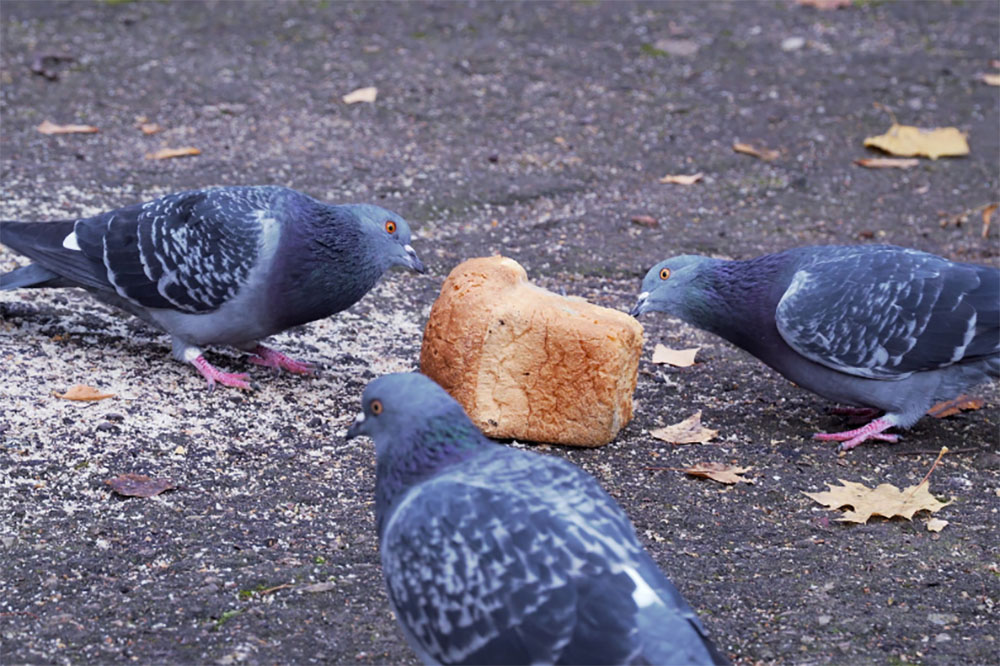
Oats
Okay, so, cards on the table…pigeons aren’t big fans of oats, which is kind of weird, because they’re a very healthy treat, capable of giving these birds tons of energy, keeping them warm, and helping them build lots of strong muscles.
Oats will also fortify your feathered friend’s nervous system, but they can hinder eggshell production, so don’t feed any to expecting pigeons.
Barley
Here’s another snack pigeons aren’t very enamored by, and, in a way, we understand. Barley isn’t rich in nutrients, and the crude fiber content is indigestible to pigeons, but despite this, it’s very easy on the guts, helping to prevent diarrhea during the colder months.
Pulses
Super high in proteins (22–40%) and low in fats (1–5%), pulses are an amazing treat for your pigeon! For the uninitiated, pulse is an umbrella term for any bean, pea, or lentil.
Pulses are incredibly rich in calcium, which is beneficial to avian reproduction, and the phosphorus content aids in the utilization of said calcium.
They’re also loaded with Vitamin B1, which is essential to preventing neurodegenerative diseases and physical deterioration.
They don’t contain much carotene, which helps to galvanize the nervous system and cellular health of a pigeon, but other than that, they’re a fantastic dietary staple.
Rye
Rye doesn’t contain as many nutrients as some of the other snacks on this list, but pigeons that eat it in the wild seem to enjoy it a great deal, so there’s no harm in it forming a small part of their diet.
Peas
While peas are technically pulses, they’re such a good choice for your pigeon that we thought we’d shine the spotlight on them as an individual food too.
With a 22–26% protein content, peas are great for the physical development of pigeons, and they only contain between 0.1–2% fat. They can help maintain healthy plumage, reduce fatigue, fortify the immune system, and, to top it all off, pigeons find them very easy to digest.
Vetch
You may not have heard of vetch, as it’s a pretty obscure pigeon treat. It’s a member of the pea family, and it’s full of healthy goodness. In fact, this plant is so wholesome that it can be used by humans as a medicinal herb for treating spider bites and sore eyes.
American vetch is also considered by some to be an aphrodisiac, so if you’re trying to cultivate a bit of romance between your two pigeons, a few vetch seeds may be just the ticket.
It’s best to introduce vetch to a pigeon’s diet incrementally, as too much at once can cause stomach upset, which is obviously unpleasant for the bird, but unpleasant for you too, as you have to clean up after them.
If you’re thinking about becoming a pigeon parent, it’s important that you study up on pigeon diet, as improper feeding is one of the leading causes of pigeon health problems.
You don’t have to be so fastidious when feeding the feral pigeons that crowd around you when you’re eating a sausage roll on a park bench, but you should still be mindful of their health.
As long as it’s not too salty, they can have a nibble on the pastry crumbs you brush off your shirt, but don’t give them any of the meat. Although they’ll eat it from time to time, pigeon digestive systems simply aren’t designed for an omnivorous diet.
What Do Pigeons Eat Other Than Grains And Seeds?
If seeds and grains are all a pigeon can scavenge, it’s quite common for them to develop a calcium deficiency, which can lead to rickets and other debilitating ailments, so let’s take a look at some of the options that can safely diversify their diet.
Fruits And Berries
We’ve touched upon their love of fruit and berries already. Wild pigeons will often chow down on some grapes, raspberries, blueberries…whatever’s around really.
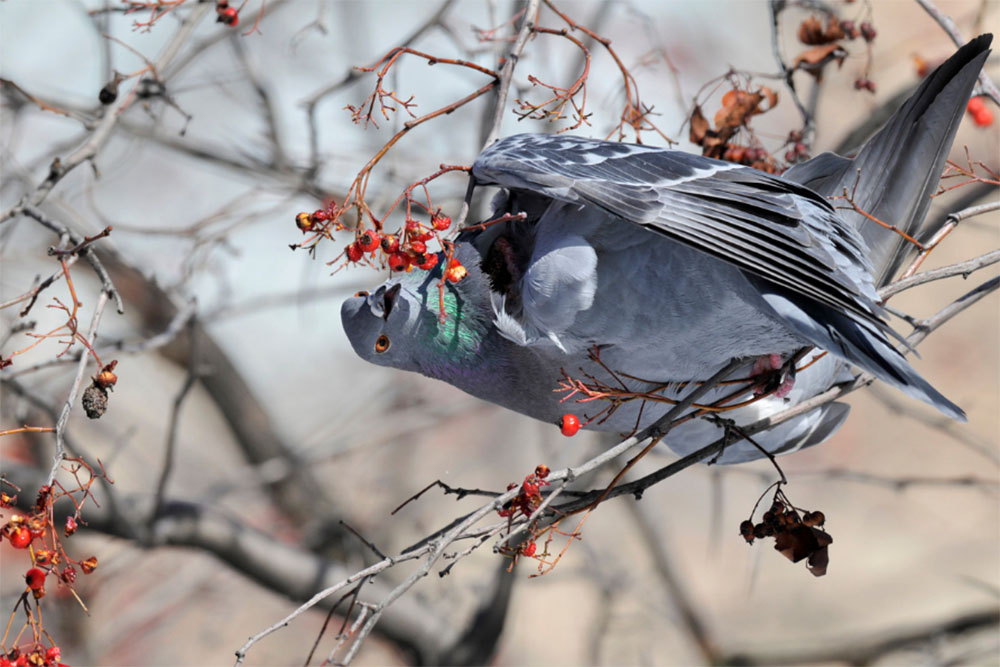
In fact, if your feathery child has anything stressful on the horizon, such as a visit to the vets, a little bit of orange can boost their immune system and put a little spring in their step. Some pigeons are also partial to mashed bananas from time to time.
Nuts
Believe it or not, pigeons go nuts for nuts. They enjoy gobbling down beechnuts, Brazil nuts, almonds, hickory nuts, pine nuts, macadamia nuts, pecans, walnuts, and even the odd unsalted peanut.
Much like seeds, nuts are full of nutrients, which is why some owners feed their racing pigeons a raw peanut every single day; however, it’s best to keep most other nuts as an every-now-and-again sort of treat.
You should be particularly careful with acorns, as, even though pigeons do enjoy them, their tannin content can be dangerous in large quantities.
Vegetables
Pigeons don’t need any encouragement to eat their leafy greens. They’ll happily wolf down spinach (in moderation), lettuce, broccoli, kale, sprouts, cabbages, and a number of other healthy treats.
They don’t necessarily have to be green either, as things like carrots, bell peppers, and cauliflower are also on the menu.
You can feed your pigeon a veggie snack 3 to 4 times a week. It should be chopped or minced, and it should be a fairly small amount. Grains and seeds should still make up the bulk of their diet.
Insects
Insects make up only a very small portion of a wild pigeon’s diet, but they contain plenty of protein, iron, fats, and calcium.
Grit
Yep, you read that right…grit. Pigeons don’t eat as much grit as some other birds, but they do eat some. The grit acts like tiny internal teeth, mulching hard food as it travels through the gizzard.
Crop Milk
Have you ever wondered what baby pigeons eat? Well, technically speaking, for the first week or so of their lives, they don’t eat anything, they just drink crop milk.
That’s not to say pigeons have a bunch of secret nipples hidden beneath their feathers; crop milk isn’t actually milk. It’s the regurgitated, half-digested food of the parent pigeon. It’s more liquid than solid and has a milky-white coloring.
Busting The Bread Myth
Traditionally, people feed wild birds bread, but over the last couple of decades, this classic bird treat has been falling out of favor, as people are waking up to the fact that stuffing our feathered friends full of bread on the daily probably isn’t all that good for their health.
Then, something flipped the system, and rumors began circulating about bread being dangerous for birds to eat, and that we should never feed it to them again.
Well, the truth is that bread is neither good nor bad for birds. It has very little nutritional value, but it’s not poisonous either. To birds, bread is an empty filler.
Feeding pigeons a small amount is perfectly harmless, but if you feed them too much, they won’t feel the need to seek out the other more important fixtures of their diet, and over time, this can make them quite ill.
What About Water?
We don’t really think about birds drinking, but just like every other animal on this Earth, they cannot live without water. In the wild, pigeons will drink from natural sources, like the shallow edges of a pond or the rivulets of a small stream.
Similar to any other pet, captive pigeons must have constant access to fresh water. If, for whatever reason, your pigeon is refusing to drink, try dipping the very tip of their beak in a water dish and holding it there for about 20–30 seconds.
Pigeons And Nutrition
The pigeons we meet in the city may seem like streetwise toughs from the wrong side of the tracks, especially when compared to our prize pet pigeons, but the one thing they all have in common is that they need a balanced, nutritious diet to live long, healthy lives.
However, even the healthiest diets aren’t always enough to keep these birds in prime condition, which is why owners will augment their diets with nutritional supplements.
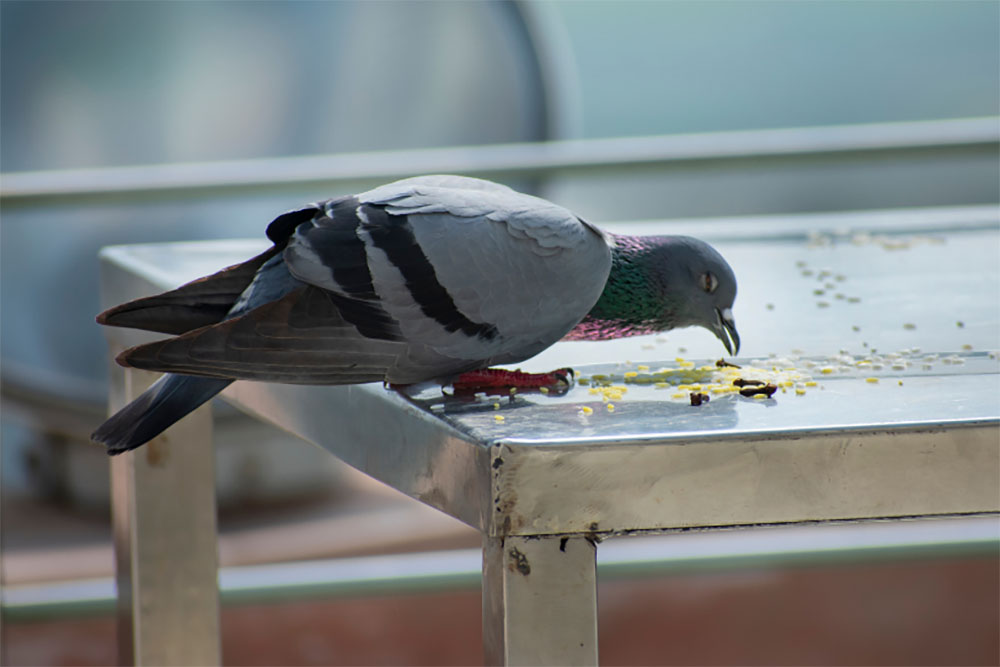
These little dietary boosters are particularly important during competition season for racing pigeons, and during malting, breeding, and growing periods for noncompetitive pigeons.
These supplements fall into two main categories. A, E, D, and K are all fat-soluble vitamins that occur naturally in a pigeon’s body, so although they’re required in supplement form, dosage should be quite low.
Vitamins B Complex, C, and F are water-soluble nutrients that pigeons cannot produce naturally, so you’ll typically use a slightly higher dosage.
Vitamin A
Vitamin A does a lot of heavy lifting in our pigeons’ bodies. It helps to maintain feather, skin, eye, bone, hearing, bone, and mucus membrane health.
Vitamin B Complex
Vitamin B Complex is actually a collection of different B vitamins all wrapped up in a single supplement.
It typically includes thiamine or B1, riboflavin or B2, niacin or B3, choline or B4, pantothenic acid or B5, pyridoxine or B6, biotin or B7, folic acid or B9, and cobalamin or B12.
They help to break down and metabolize nutrients, ensuring they’re getting the most out of all their food and other supplements.
Being that none of these nutrients are naturally occurring in a pigeon’s physiology, deficiencies are common and can be quite severe.
Vitamin C
Vitamin C is found in a supplement known as ascorbic acid. As a water-soluble vitamin, it cannot be stored in the body tissue of a pigeon. Vitamin C is both an antioxidant and an important part of collagen and carnitine synthesis.
Vitamin D
Vitamin D is a naturally occurring vitamin derived from the sun. It facilitates the absorption of calcium into the body. Racing pigeons require more calcium than any other mineral to stay race-ready, and soon-to-be mother pigeons need plenty to form strong eggs.
Vitamin E
Vitamin E inhibits reactive oxygen species in tissue and cells, amounting to enhanced egg fertility and hatchability, greater sperm motility, and strong postnatal growth. If your pigeons are getting ready to breed, vitamin E is a must!
Vitamin F
Vitamin F is all about structuring and reinforcing cells to optimize growth and development. It can also strengthen immune responses, and keep our pigeons from falling ill.
Vitamin K
Vitamin K is essential to blood coagulation, meaning it helps blood to clot in a wound to prevent excessive bleeding.
This vitamin can be sourced from leafy greens, and it occurs naturally in the digestive tract of pigeons, but it doesn’t hurt to have a little help, especially if your pigeon is on antibiotics, as they can kill off the bacteria responsible for producing it.
Pigeon Nesting And Breeding Habits
Pigeon nests aren’t exactly the most robust structures. In fact, in some cases, they’re hilariously sparse — we’re talking a few twigs on the ground (sometimes the twigs aren’t even touching). But most of the time, they do resemble a normal bird nest.
The male and the female share nest-building duties, and craft small, saucer-like structures out of twigs, straw, and debris. They’re not all that fussy when it comes to nest location.
If they can find a suitable tree – perfect, but it’s not a problem if there aren’t any around.
They’ll set up shop on a building ledge, in a barn, under bridges, on roofs, among the beams of a loft… sometimes even on the ground. As long as a location is dry, flat, and relatively protected, they don’t mind.
Pigeons are monogamous, and they’ll mate for life. They typically lay 1 to 2 eggs during each reproductive cycle, and they may raise as many as 6 broods a year.
The male and female take turns incubating the eggs, while the other hunts for food. Hatching usually occurs after about 18 days, followed by a month-long fledgling period.
What Are Homing Pigeons?
Homing pigeons are pet pigeons that are trained to fly home over massive distances.
Some of them are bred and trained to race over long distances, too. Their diet needs to be carefully regimented to ensure they’re capable of performing these impressive physical feats.
If you’re an enthusiast hoping to one day care for some homing pigeons of your own, our advice is to study up, and learn everything there is to know about pigeon care.
Their intelligence and kind nature make pigeons wonderful pets, but you have to be able to give them the love and care they deserve.

